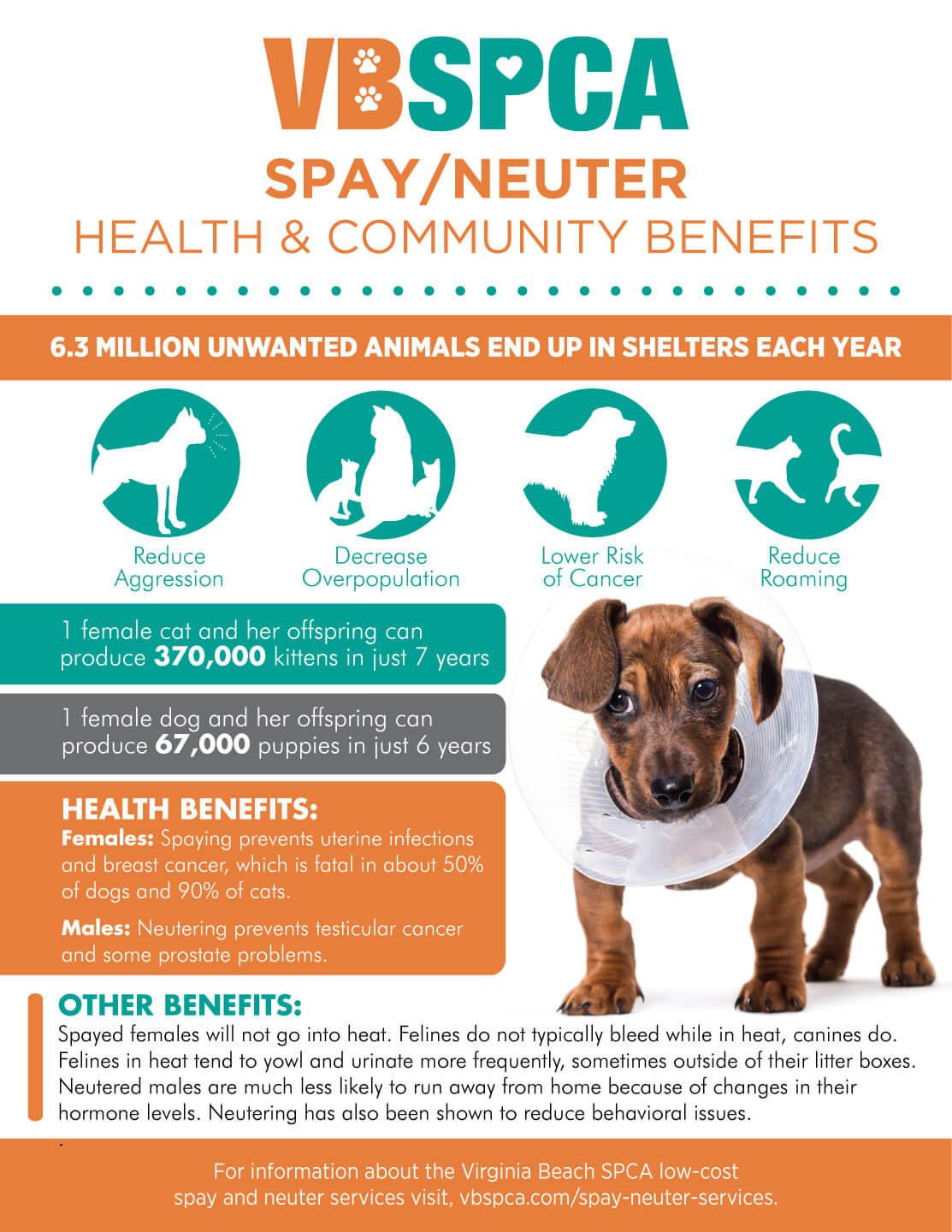Does My Pet Need To Be Spayed Or Neutered Spaying or neutering your pet is important to maintain their health and prevent unwanted behaviors. It helps prevent certain diseases and reduces the risk of reproductive cancers, while also decreasing aggressive behavior.
Contents
Benefits Of Spaying Or Neutering
Spaying or neutering your pet is a responsible decision that offers numerous benefits both for your furry friend and for you as a pet owner. Not only does it help prevent the birth of unwanted litter, but it also reduces certain health risks. Let’s explore these benefits in more detail.
Prevention Of Unwanted Litters
One of the primary reasons many pet owners choose to spay or neuter their pets is to prevent the birth of unwanted litters. This is particularly important if you have a female pet, as spaying eliminates the risk of unplanned pregnancies and the added stress of caring for and finding suitable homes for the resulting puppies or kittens.
Reduction Of Certain Health Risks
Spaying or neutering can significantly reduce the risk of certain health issues in your beloved pet. Females benefit from spaying in that it eliminates the chances of developing uterine infections and reduces the risk of mammary tumors, particularly if performed before their first heat cycle.
For male pets, neutering helps prevent the occurrence of testicular cancer and reduces the risk of prostate problems as they age. Additionally, neutering can aid in reducing undesirable behaviors such as aggression, roaming, and marking territory.

Credit: www.effinghamvets.com
When To Spay Or Neuter
Spaying or neutering your pet is essential to ensure their health and prevent unwanted behaviors. Discussing the ideal timing with your veterinarian will help you make the right decision for your furry friend.
Pet owners often wonder when is the right time to spay or neuter their furry companions. This decision is crucial for their health, behavior, and overall well-being. Here, we will explore the age considerations and behavioral factors that can guide you in making this important choice.
Age Considerations
Determining the ideal age to spay or neuter your pet can vary depending on the species, breed, and size. Generally, it is recommended to spay or neuter cats and dogs between 6 to 9 months of age. However, larger dog breeds may benefit from waiting until they are at least 1 year old, allowing their growth plates to close properly. Scheduling the procedure around this timeframe helps prevent unwanted litter and certain reproductive-related diseases.
Behavioral Factors
Spaying or neutering your pet impacts their reproductive abilities and plays a significant role in their behavior. For instance, male dogs and cats that have not been neutered may demonstrate aggressive tendencies, including territorial marking, roaming, or dominance-related behaviors. By neutering them, these unwanted behaviors can often be reduced or eliminated, leading to a more harmonious household. Similarly, female dogs and cats that are not spayed may exhibit signs of being in heat, such as yowling, restlessness, and attracting unwanted attention from intact males. Spaying can help alleviate these behavioral issues and eliminate the risk of potentially life-threatening conditions like uterine infections or mammary tumors. In addition to improving behavior, spaying or neutering your pet can prevent certain health issues. For instance, spaying reduces the risk of uterine infections and mammary tumors in female animals, while neutering decreases the likelihood of prostate problems and testicular cancer in males. It is worth considering the long-term health benefits associated with these procedures. In conclusion, determining the right time to spay or neuter your pet involves considering age considerations and behavioral factors. By scheduling the procedure at the appropriate age and addressing any behavioral issues that may arise, you can ensure the well-being of your furry friend. Remember to consult your veterinarian for personalized advice tailored to your pet’s needs. By taking this crucial step, you are not only promoting their health but also contributing to the pet overpopulation crisis.
Procedure And Recovery
Spaying or neutering your pet is a common procedure that can help prevent certain health issues and behavior problems. The recovery process typically involves some rest and monitoring, but most pets bounce back quickly.
What To Expect During The Surgery
When it comes to spaying or neutering your pet, understanding the procedure and recovery is crucial. This ensures that you are fully prepared for what will happen before, during, and after the surgery.
During the surgery, your pet will be placed under general anesthesia. This means that they will be unconscious and won’t feel any pain throughout the procedure. The veterinarian will make a small incision near the reproductive organs. For females, this is typically the abdomen, while for males, it is the scrotum.
The reproductive organs, including the ovaries and uterus in females, or the testes in males, will be removed. This is a routine surgical procedure that trained veterinarians perform. The incision will be closed using dissolvable stitches, eliminating the need for a follow-up appointment to remove them.
Post-operative Care
Proper post-operative care is essential to ensure a smooth and speedy recovery for your pet. Here are some important points to keep in mind:
– Monitor your pet closely as they wake up from anesthesia. They may be groggy or disoriented, so it’s essential to provide a calm and comfortable environment.
– Avoid giving your pet any food or water for a few hours after the surgery. This allows their body to fully recover from the effects of anesthesia.
– Limit your pet’s activity for the first few days. Avoid strenuous exercise and provide a quiet and comfortable space for them to rest.
– Be mindful of the incision site. Keep it clean and dry to prevent infection. Monitoring for any signs of redness, swelling, or discharge is crucial.
– Follow the veterinarian’s instructions regarding medication. Pain medication or antibiotics may be prescribed to aid in your pet’s recovery.
– Prevent your pet from licking or biting at the incision site. An Elizabethan collar can be used to ensure they cannot access the area.
By providing the necessary post-operative care, you will help your furry friend heal effectively and minimize any potential complications.

Credit: vbspca.com
Myths And Misconceptions
Spaying or neutering your pet is a crucial step in their overall health and well-being. Contrary to myths and misconceptions, it does not make them lazy or alter their personality. It helps prevent unwanted behaviors, reduces the risk of certain diseases, and contributes to controlling pet overpopulation.
When it comes to spaying or neutering your pet, many myths and misconceptions can cloud your judgment. It’s important to separate fact from fiction to make the best decision for your furry friend. Let’s debunk some common myths and clear up any misconceptions you may have.
Loss Of Natural Instinct
One of the biggest myths surrounding spaying or neutering is that it will result in a loss of instinct in your pet. The truth is, while the procedure may reduce certain behaviors related to mating, such as roaming and marking territory, it does not eliminate your pet’s instincts. Spaying or neutering can have several benefits for both male and female pets. For females, spaying eliminates the risk of certain reproductive health issues like uterine infections and mammary tumors. For males, neutering can prevent testicular cancer and reduce the risk of prostate problems. So, rather than losing their instincts, spaying or neutering can help your pet live a healthier and longer life.
Negative Impact On Personality
Another common misconception is that spaying or neutering will negatively impact your pet’s personality. This is simply not true. The procedure can often have a positive effect on their behavior. For example, spaying a female pet can eliminate the stress and discomfort associated with going into heat, which can lead to behavioral changes like restlessness and aggression. Neutering a male pet can reduce aggressive and dominant behaviors, making them more sociable and less prone to wandering. It’s important to understand that the procedure itself does not cause personality changes. Any behavioral changes that may occur are typically the result of a reduction in hormone-driven behaviors and not the surgery itself. Remember, each pet is unique, and their personality will remain intact after spaying or neutering. In conclusion, dismissing the myths and misconceptions surrounding spaying or neutering is crucial in making an informed decision for your pet’s health and well-being. By understanding the facts and considering the benefits, you can ensure a happier and healthier life for your furry friend.

Credit: vetncare.com
Frequently Asked Questions On Does My Pet Need To Be Spayed Or Neutered
Is It Necessary To Spay Or Neuter A Dog?
Yes, it is necessary to spay or neuter a dog. Spaying prevents females from getting pregnant and reduces the risk of certain health issues like uterine infections. Neutering decreases aggressive behavior, lowers the risk of cancer, and helps prevent roaming or marking territory.
What Happens If You Don’t Spay Or Neuter Your Dog?
Not spaying or neutering your dog can lead to unwanted pregnancies, behavioral problems, and an increased risk of certain health issues. Spaying female dogs eliminates the risk of uterine infections and reduces the risk of mammary tumors. Neutering male dogs prevents testicular cancer and reduces aggression and marking behaviors.
Have Your Pets Spayed Or Neutered?
Yes, it is highly recommended to spay or neuter your pets. It helps prevent overpopulation, reduces the risk of certain cancers, and improves overall behavior.
Conclusion
Spaying or neutering your pet is a responsible choice that offers numerous benefits. It helps combat the overpopulation of stray animals, reduces the risk of certain health issues, and can improve your pet’s behavior. Additionally, many cities and organizations offer affordable or low-cost spay/neuter services to make it more accessible for pet owners.
By deciding to spay or neuter your pet, you are contributing to their overall health and well-being, as well as the welfare of the animal community as a whole.




